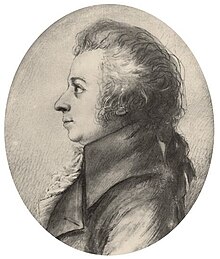Our website is made possible by displaying online advertisements to our visitors.
Please consider supporting us by disabling your ad blocker.
Wolfgang Amadeus Mozart
Wolfgang Amadeus Mozart | |
|---|---|
 Silverpoint drawing by Doris Stock, 1789 | |
| Born | Johannes Chrysostomus Wolfgangus Theophilus Mozart 27 January 1756 |
| Died | 5 December 1791 (aged 35) |
| Cause of death | Uncertain |
| Resting place | Vienna |
| Occupation(s) | Composer, instrumentalist, music teacher |
| Years active | 1761 – 1791 |
| Notable work | The Marriage of Figaro Don Giovanni Cosi fan tutte The Magic Flute Symphony in C major ("Jupiter") Piano Concerto in D minor Clarinet Concerto in A major Serenade for 13 Wind Instruments Requiem |
| Style | Classical |
| Spouse | Constanze Mozart |
| Children | 6 children; 4 sons and 2 daughters |
| Parent(s) | Leopold Mozart and Anna Maria Mozart |
| Relatives | Maria Anna Mozart (sister) |
| Signature | |
Wolfgang Amadeus Mozart (January 27, 1756 – December 5, 1791; pronounced MOHT-sart) was a composer, instrumentalist, and music teacher. His full baptised name was Johannes Chrysostomus Wolfgangus Theophilus Mozart. He was born in Salzburg (then a free archbishopric city within the Holy Roman Empire, now Austria). He was the youngest child of Leopold and Anna Maria Mozart. From a very early age, the young Mozart showed great musical talent. He toured Europe with his parents and older sister "Nannerl" for several years. In these tours, he performed for royalty and the aristocratic elite.
As a young man, Mozart worked in Paris, Mannheim and Munich. He returned to Salzburg. In Salzburg, he worked for the court of the Archbishop of Salzburg. He was restless, aware of his genius, and thought Salzburg too small for his talent. He moved to Vienna where he had some success. In Vienna, he married Constanze Weber. They had two sons. He died in Vienna after a brief but unknown illness.
Mozart wrote more than 800 musical works. Many have the highest musical quality. His works include the operas The Marriage of Figaro, Don Giovanni, Così fan tutte and The Magic Flute; the symphonies in E-flat major, G minor, and C major ("Jupiter"). He wrote concertos for piano, violin, and different wind instruments. He also wrote many chamber pieces, church music, minuets, dances, songs, and a Requiem. Along with Bach and Beethoven, Mozart is viewed as one of the greatest composers who ever lived.
Previous Page Next Page


